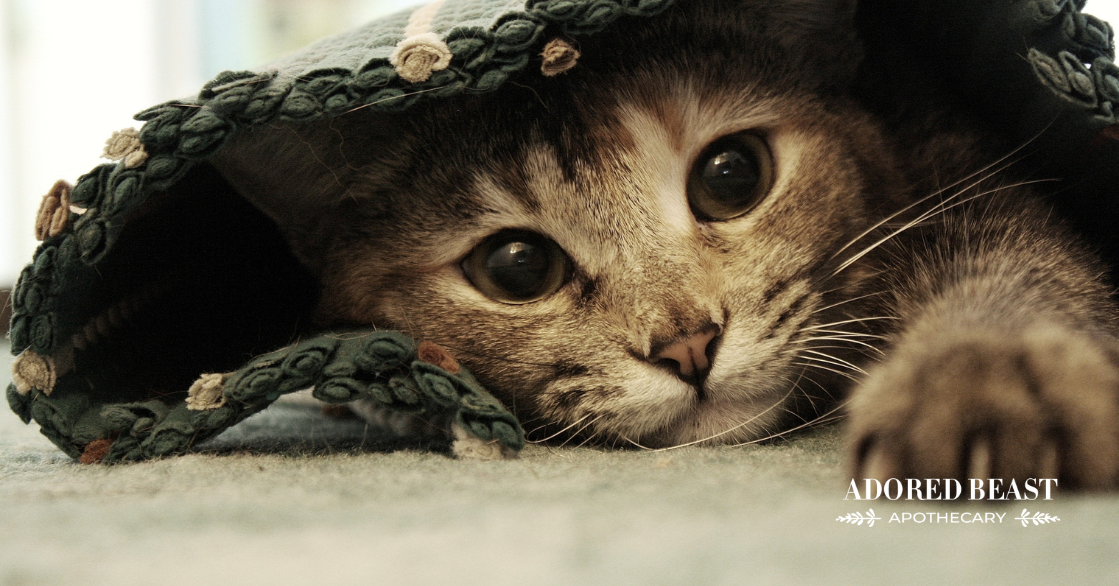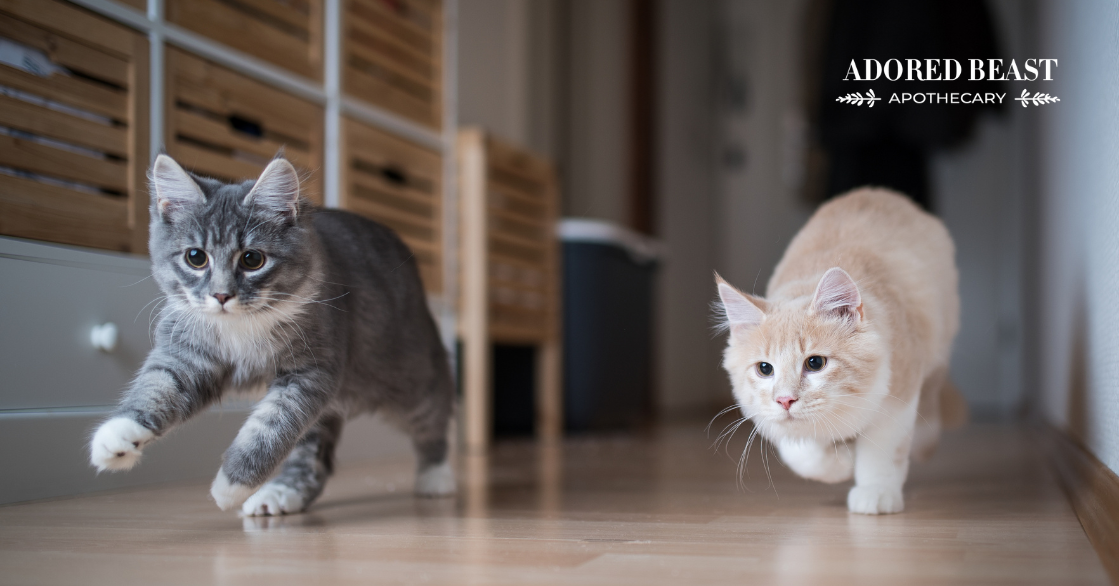Most people don’t actually think about the act of breathing very often. It just sort of happens.
And the same goes for our pets. Unless we’re concerned that something is wrong, we often don’t think about their breathing. Or how we can help protect it.
Your cat’s respiratory system is essential for supplying oxygen to tissues, removing carbon dioxide, maintaining acid-base balance, and supporting various physiological processes necessary for their survival and well-being…
Thankfully, there are plenty of things we can do to provide respiratory support for cats. And that’s what we’re covering today!
Your Cat’s Respiratory System
The anatomy of the respiratory tract varies among species. For example, the respiratory systems of dogs and cats are somewhat similar to each other, but different from the respiratory systems of horses and humans.
All species have some staples though, like the lungs, and those are the major players here. The basic function is the same: when your cat takes a breath, they take in air through the nose and mouth. This air travels down their trachea through tubes called bronchioles, then into the lungs. That’s a very simple explanation of course.
This journey delivers oxygen into the blood, which distributes it throughout the body, all the while removing wastes such as carbon dioxide.
The respiratory system does a lot more, though:
- Filters out large airborne particles and destroys small particles and microorganisms that threaten the immune system.
- Facilitates the exchange of gases, particularly oxygen and carbon dioxide, between the air and the bloodstream.
- Helps regulate the body’s pH balance by controlling the levels of carbon dioxide in the bloodstream.
- Plays a role in regulating body temperature in cats. Breathing can help expel excess heat from the body, especially during panting.
What’s Impacting Their Breathing?
Unfortunately, with so much riding on this system, threats or damage can have a big impact. There are several different respiratory issues in cats – these are a few of the most common:
- Upper Respiratory Infections (URIs): These are the most common respiratory issues in cats, often caused by viruses such as feline herpes virus and feline calicivirus. As a Symptoms include sneezing, nasal discharge, coughing, and conjunctivitis. ** It’s important to note that both of these are highly contagious and prevalent in high stress situations coupled with cats who are around other cats, such as shelters, or feral cats. You want to minimize spreading if your kitty has an upper respiratory infection.
- Asthma: Asthma is a chronic inflammation of the airways that can cause wheezing, coughing, and difficulty breathing. Asthma affects approximately 1% of the general cat population, but it may be more prevalent in certain breeds, such as Siamese cats.
- Bronchitis: Bronchitis involves inflammation of the bronchial tubes and can lead to coughing and difficulty breathing.
- Pneumonia: Pneumonia is an infection of the lungs that can be caused by bacteria, viruses, or other pathogens. Symptoms include coughing, difficulty breathing, fever, and lethargy.
- Feline Infectious Peritonitis (FIP): FIP is a viral disease caused by a coronavirus. It can affect various organs, including the respiratory system, leading to symptoms such as difficulty breathing and lethargy.
You may have noticed that the symptoms of all of these are similar. If you see any of these, or are concerned about your cat’s respiratory health, speak with your trusted veterinarian:
- Shortness of breath/difficulty breathing/wheezing
- Coughing
- Sneezing
- Nasal discharge
- Lethargy
- Conjuntivitis
- Loss of appetite
- Fever
- Ulcers in the mouth
Respiratory Support for Cats
So we know that our cats’ respiratory systems play a big role in their overall health. These tips can help provide valuable respiratory support for cats, making breathing easier, and helping to prevent issues from occurring.
1. Remove Irritants
Anything your cat breathes in goes through the respiratory system, so you want to try and remove/eliminate anything that can be irritating:
- Consider moving to natural cleaners in your home
- Avoid the use of air fresheners, fabric sprays, or scented candles
- If your pet has environmental allergies, wipe paws and legs after being outside
- Consider an air filter inside to help cleanse the air of potential irritants
- Assess the diet and make sure that there are no ingredients that your individual cat reacts to. Remove those, if possible, or switch to a food without those ingredients.
- Stress!! It might seem odd to have this here, but stress can be a major irritant to not just the respiratory system, but the entire body in general. Try to minimize stress as much as possible in your cat’s environment. And that helps everyone in the family, not just our feline friends.
2. Helpful Herbs
Several different herbs are helpful for respiratory support for cats. Many have an affinity for the lungs and respiratory system! These include:
- Marshmallow root – with its high mucilage content, marshmallow root has strong demulcent properties, which can help reduce swelling and irritation in the mucous membranes and support calming in the respiratory tract
- Slippery elm – another demulcent herb, slippery elm coats the respiratory tract, which, like marshmallow root, can help to soothe irritate tissues and mucous membranes
- Licorice root – another demulcent herb, licorice roots can help to soothe inflamed mucous membranes and it also has decongesting and expectorant properties. We recommend only using deglycyrrhizinated licorice (DGL) because it has the glycrrhizin removed.
- Mullein – it’s famed for its use with respiratory issues. Similar to marshmallow, it has a high mucilage content, and because of its saponin content, mullein also acts as an expectorant, meaning it makes it easier for the lungs to clear themselves of mucous.
3. Supportive Supplements & Foods
There are many different supplements that you can introduce to help respiratory support for cats. Consider adding any or all of the following:
- Omega-3 fatty acids – new research suggests omega-3s can play a significant role in lung health. The study specifically found that higher levels of omega-3 fatty acids in the blood are associated with a reduced rate of lung function decline and that higher levels of omega-3 fatty acids – including DHA – are associated with better lung function.
- Antioxidants – antioxidants, specifically carotenoids like beta-carotene, can help to protect the lungs and respiratory system.
- Lung (organ meat) – like feeds like!
**Tip: As mentioned, it’s really important to assess your cat’s food. Sometimes it’s just one ingredient in their food that’s causing the issue!
4. Watch Their Weight
If your pet is overweight, this puts added stress on the entire body, including the respiratory system. You want this system to be able to function at its peak, without pressure or strain.
To help your cat achieve and maintain a healthy weight:
- Consider how you can incorporate exercise into their daily routine (meet their abilities)
- Think about swapping out high calorie treats for a healthier option, and cut back if you tend to overindulge
- Support the gut to help it better digest food and metabolize fats
- Consider switching from a highly-processed diet to a fresh, whole food diet
5. Cleanse the Body
Want to support the respiratory system? Support the other organs!
A great way to do this is with a gentle detox. Toxic build-up puts pressure on the body, which means it has to work harder to do its job. And this can make it harder for every organ.
With a gentle detox, especially as the seasons change, you can help clean out the organs – the liver, kidneys, pancreas, and gallbladder in particular – to help rebalance and bring the body back to homeostasis.
Several herbs are good for this, including dandelion root, greater celandine, milk thistle, and barberry – all of which can be found in our Liver Tonic!
We all want to breathe easy, and our cats are no different. These tips for respiratory support for cats provide some very simple protection for a very complex system. With a little extra TLC, we can help support and protect the respiratory system and keep our animals healthy and happy!












![[RESEARCH] Is Herbicide Safe for Dogs?](https://blog.adoredbeast.com/wp-content/uploads/2025/06/herbicides-safe-for-dogs-103x55.png)